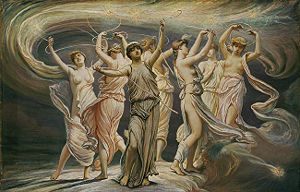- Pleiades (Greek mythology)
-
For the Pleiades in other mythologies, see Pleiades in folklore and literature.
The Pleiades (
 /ˈplaɪ.ədiːz/ or /ˈpliːədiːz/; Greek: Πλειάδες [pleːádes], Modern [pliˈaðes]), companions of Artemis, were the seven daughters of the titan Atlas and the sea-nymph Pleione born on Mount Cyllene. They are the sisters of Calypso, Hyas, the Hyades, and the Hesperides. The Pleiades were nymphs in the train of Artemis, and together with the seven Hyades were called the Atlantides, Dodonides, or Nysiades, nursemaids and teachers to the infant Bacchus.
/ˈplaɪ.ədiːz/ or /ˈpliːədiːz/; Greek: Πλειάδες [pleːádes], Modern [pliˈaðes]), companions of Artemis, were the seven daughters of the titan Atlas and the sea-nymph Pleione born on Mount Cyllene. They are the sisters of Calypso, Hyas, the Hyades, and the Hesperides. The Pleiades were nymphs in the train of Artemis, and together with the seven Hyades were called the Atlantides, Dodonides, or Nysiades, nursemaids and teachers to the infant Bacchus.There is some debate as to the origin of the name Pleiades. Previously, it was accepted the name is derived from the name of their mother, Pleione. However, the name Pleiades may derive from πλεῖν (to sail) because of their importance in delimiting the sailing season in the Mediterranean Sea.
Contents
The Seven Sisters
Several of the most prominent male Olympian gods (including Zeus, Poseidon, and Ares) engaged in affairs with the seven heavenly sisters. These relationships resulted in the birth of their children.
- Maia, eldest of the seven Pleiades, was mother of Hermes by Zeus.
- Electra was mother of Dardanus and Iasion, by Zeus.
- Taygete was mother of Lacedaemon, also by Zeus.
- Alcyone was mother of Hyrieus by Poseidon.
- Celaeno was mother of Lycus and Eurypylus by Poseidon.
- Sterope (also Asterope) was mother of Oenomaus by Ares.
- Merope, youngest of the seven Pleiades, was wooed by Orion. In other mythic contexts she married Sisyphus and, becoming mortal, faded away. She bore to Sisyphus several sons.
Mythology
After Atlas was forced to carry the heavens on his shoulders, Orion began to pursue all of the Pleiades, and Zeus transformed them first into doves, and then into stars to comfort their father. The constellation of Orion is said to still pursue them across the night sky.
One of the most memorable myths involving the Pleiades is the story of how these sisters literally became stars, their catasterism. According to some versions of the tale, all seven sisters committed suicide because they were so saddened by either the fate of their father, Atlas, or the loss of their siblings, the Hyades. In turn Zeus, the ruler of the Greek gods, immortalized the sisters by placing them in the sky. There these seven stars formed the constellation known thereafter as the Pleiades.
The Greek poet Hesiod mentions the Pleiades several times in his Works and Days. As the Pleiades are primarily winter stars, they feature prominently in the ancient agricultural calendar. Here is a bit of advice from Hesiod:
- "And if longing seizes you for sailing the stormy seas,
- when the Pleiades flee mighty Orion
- and plunge into the misty deep
- and all the gusty winds are raging,
- then do not keep your ship on the wine-dark sea
- but, as I bid you, remember to work the land."
(Works and Days 618-23)
The Pleiades would "flee mighty Orion and plunge into the misty deep" as they set in the West, which they would begin to do just before dawn during October–November, a good time of the year to lay up your ship after the fine summer weather and "remember to work the land"; in Mediterranean agriculture autumn is the time to plough and sow.
The poet Lord Tennyson mentions the Pleiades in his poem Locksley Hall:
- "Many a night I saw the Pleiads, rising through the mellow shade,
- Glitter like a swarm of fire-flies tangled in a silver braid."
See also
- Peleiades
- Krittika
- Alexandrian Pleiad
Notes
References
- Kohn, Rachael (October 10, 2004). "The Seven Stars of the Pleiades". Australian Broadcasting Corporation. http://www.abc.net.au/rn/relig/spirit/stories/s1213298.htm. Retrieved 2007-05-01.
Categories:- Greek mythology
- Nymphs
Wikimedia Foundation. 2010.


